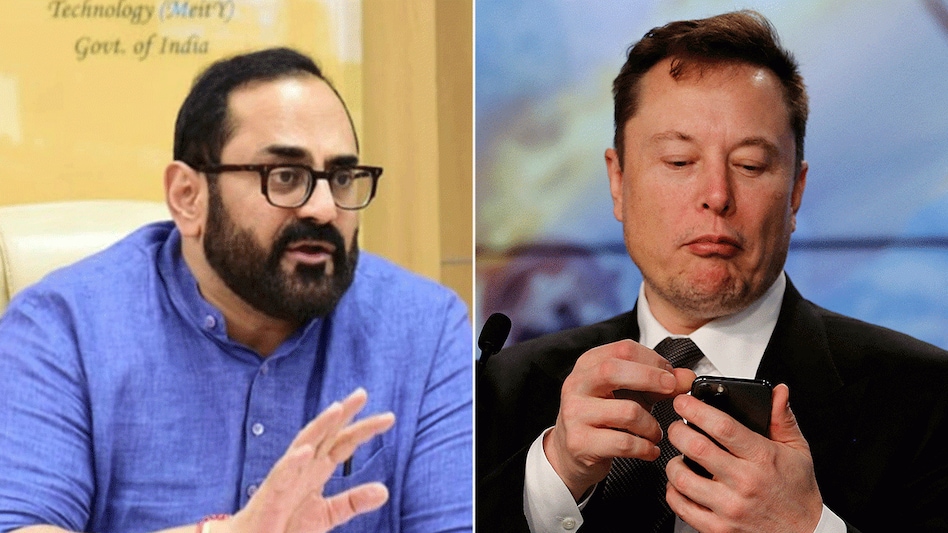


Congress leader Rahul Gandhi and former Union Minister Rajeev Chandrasekhar have responded to tech billionaire Elon Musk's recent comments regarding the elimination of Electronic Voting Machines (EVMs) in India. While Gandhi raised concerns about the lack of transparency and accountability in India's electoral process, Chandrasekhar defended the security protocols of Indian EVMs, stating that they are custom-designed, secure, and isolated from any network or media. The opposition parties have been demanding a 100% count of VVPAT slips, but their request was denied.
EVM and VVPAT: A Debate on Indian Electoral Transparency
Background:
Electronic Voting Machines (EVMs) and Voter-Verified Paper Audit Trails (VVPATs) have been central to the Indian electoral process since their introduction in 2000. EVMs are used to record votes electronically, while VVPATs provide a paper trail for verification.
Recent Developments:
In recent months, the debate over EVMs has intensified. Tech billionaire Elon Musk's comments on the need to eliminate EVMs due to security concerns have reignited discussions.
Responses:
Congress leader Rahul Gandhi:
Former Union Minister Rajeev Chandrasekhar:
Opposition Demands:
Opposition parties have been demanding the following:
Top 5 FAQs:
1. Are EVMs secure?
According to the Election Commission of India, EVMs are tamper-proof and secure. However, some experts have raised concerns about the possibility of tampering through software or hardware vulnerabilities.
2. What is the role of VVPATs?
VVPATs provide a paper trail for each vote cast. After casting a vote, a paper slip showing the party symbol and candidate name is generated and displayed to the voter for verification. This paper slip drops into a sealed box and can be recounted to verify the accuracy of the EVM results.
3. Why are opposition parties demanding a 100% count of VVPAT slips?
Opposition parties argue that this would provide a more transparent and reliable verification process. They believe that random sampling of VVPAT slips may not be sufficient to detect potential discrepancies.
4. Has the Election Commission of India addressed these concerns?
The Election Commission has maintained that the current EVM system is secure and reliable. It has also ruled out the possibility of a 100% count of VVPAT slips, citing logistical challenges and the potential to derail the election process.
5. What is the future of EVMs in India?
The debate over the use of EVMs is likely to continue. As technology evolves, new security concerns may arise that could necessitate further evaluation of the EVM system. However, for the time being, EVMs remain the primary voting method in India.

After four years, the 'Darbar Move' tradition in Jammu and Kashmir has been restored, fulfilling the promise of the government and bringing a boost to the economy. National Conference chief Farooq Abdullah expressed happiness, noting that those who sought to separate Jammu and Srinagar have failed. Chief Minister Omar Abdullah received a warm reception and inspected the secretariat premises after the ceremony, as security in the region was heightened for the occasion.

Delhi Legislative Assembly Speaker Vijender Gupta praised Swami Dayanand Saraswati as not just a saint and reformer, but also a pivotal figure in India's freedom struggle. Speaking at the International Arya Samaj Conference, Gupta highlighted how Swami Dayanand's teachings sparked a revolution that led to the nation's independence. The event was attended by esteemed guests including Gujarat Governor Acharya Devvrat and top officials from the Arya Samaj community, all paying tribute to the enduring impact and legacy of Swami Dayanand Saraswati.

The Metro Railway Kolkata has announced a major schedule expansion for its Yellow Line, which runs between Noapara and Jai Hind Bimanbandar (Airport) in Kolkata. Starting from 3 November, weekday operations will increase to 120 services with extended operating hours, providing greater convenience and accessibility to commuters. Weekend travellers will also see a significant frequency upgrade, making travel on Saturdays and Sundays hassle-free. This move is expected to improve the overall public transportation system in the city and benefit the commuters.

Despite some reassurances that online verticals focused on diversity will continue, NBC News has announced a round of layoffs that will impact about 150 employees, or 2% of their workforce. The cuts are said to be a result of cost-cutting measures in preparation for the split of Comcast's cable networks into Versant. This move signifies a shift in priorities for NBC management, prioritizing corporate profits over hard-working members, according to Susan DeCarava, president of The NewsGuild of New York. This change also means that MSNBC will no longer lean on NBC News for newsgathering, with those ties expected to be severed next week.

The Kasibugga Venkateswara Temple in Srikakulam district was the site of a heart-wrenching stampede, causing multiple fatalities and affecting the community deeply. Chief Minister N. Chandrababu Naidu has expressed his sorrow over the unfortunate incident, as well as directing officials to ensure that those injured receive the best medical treatment possible. As local officials and public representatives are called to oversee relief operations, swift action is required to aid those affected and manage the situation effectively.

Indian Prime Minister Narendra Modi inaugurated the Shanti Shikhar Academy for Peaceful World in Raipur, praising the Brahma Kumaris organization for bridging India's ancient wisdom with the world's search for harmony. He credited the group's selfless service and spiritual discipline for their efforts towards universal peace. He positioned the Brahma Kumaris as protectors of India's soul and highlighted India's proactive role in addressing global crises such as disaster relief and environmental threats.

In an act of solidarity and protest, millions of Muslims in India used their Friday prayers to denounce the recent killings that took place in Pahalgam. The news comes amid growing tensions between the Muslim community and the Indian government. Many are viewing this as a sign of unity and determination from the Muslim population in India.

The state of Karnataka, or Kannada Rajyotsava, marked its 69th anniversary with a grand ceremony organized by the district administration in Mangaluru. District in-charge minister Dinesh Gundu Rao paid tribute to the leaders and writers who fought for a unified Kannada state and presented awards to 80 outstanding individuals and organizations. In his address, the minister highlighted the rich cultural and historical heritage of Karnataka and called for a sense of pride among its citizens.

Telangana's 'Run for Unity' event marked the 150th birth anniversary of Sardar Vallabhbhai Patel, India's first Deputy Prime Minister and architect of national integration. The event, carrying the message of "Ek Bharat - Shreshth Bharat", honored Patel's legacy of unity, sacrifice, and nation-building. Telangana BJP President N Ramachander Rao paid tribute to Patel and highlighted his pivotal role in integrating princely states, including Hyderabad, into the Indian Union. He also commended Prime Minister Narendra Modi and Home Minister Amit Shah for upholding Patel's ideals of national integrity.

The FBI has successfully stopped a potential terrorist attack in Michigan on Halloween weekend, according to FBI Director Kash Patel. Multiple suspects have been arrested after allegedly planning a violent attack that was connected to international terrorism. The suspects, whose ages range from 16 to 20, had engaged in firearms training and mentioned "pumpkin day" as a code for Halloween. White House Senior Director for Counterterrorism Seb Gorka confirmed the thwarted attack and stated that it was intended to occur during a time when children should be enjoying themselves.